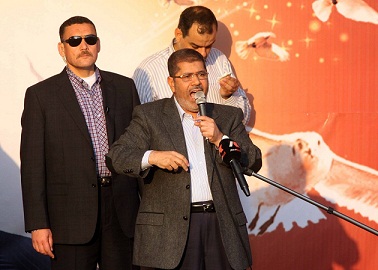
(AFP FILE PHOTO/ STR)
By Salma Abdallah
The number of detainees imprisoned since President Mohamed Morsi assumed power last June has now surpassed 3430, according to Zizo Abdo, member of 6 April Youth Movement.
A press conference was held by the 6 April Democratic Front and the Lawyers’ Syndicate on Monday to discuss the condition of revolutionaries and detainees under the rule of the Muslim Brotherhood. It was attended by a number of lawyers, activists, and ex-detainees.
The attendees agreed that the current experience of activists and detainees is worse than at any time during Mubarak’s rule.
Abdo discussed the degrading treatment and the harsh conditions he and his fellow detainees were subjected to in prison. “We sometimes got locked up in our cells for 18 to 22 hours, were served poor food and faced psychological torture,” Abdo said.
Mohamed Sobhy, a lawyer at 6 April and a member of the liberties committee of the Lawyers’ Syndicate, alleged that bail was set too high for activists and opposition members. “They are attempting to exhaust the detainees’ families,” Sobhy said, noting that the prosecution collected over EGP1m in bail fees in the past three months. The prosecution had transformed the practice of temporary detention from a mere procedure in an investigation into a penalty in of itself, he said.
Tarek El-Awady, a member of The Front to Defend Egypt Protesters, said that the public prosecution is biased, pointing out that complaints of police torture and violence committed by the president’s supporters do not seem to be pursued with the same vigor as cases against the president’s opponents. “He is not independent,” he said, referring to the fact that Morsi appointed the public prosecutor himself. “The public prosecution is abusing the law to settle scores with the opposition for the sake of the ruling party’s interests.”
Many of the detainees were arrested at random, and after being referred to investigation, found to have nothing to do with the protests. He mentioned that in the Qasr El-Nil Bridge clashes, for example, most of the detainees were children who had only been watching the events. None of them were convicted.
El-Awady mentioned that the current regime is attempting to reproduce the police state by replacing the minister of interior’s power with that of the public prosecutor, and Emergency Law with a more general overreach of the law to clamp down on opposition groups. He thinks that the only solution, therefore, is to drop the constitution that gives wide-ranging powers to the president and public prosecutor.
At the meeting’s closure, the activist Hamada El-Masry called on the people to participate in the 30 June protests, but one of the attendees called it an attempt to create unrest in the country. In response, the attendees broke into chanting, “Down with the Muslim Brotherhood rule.”


